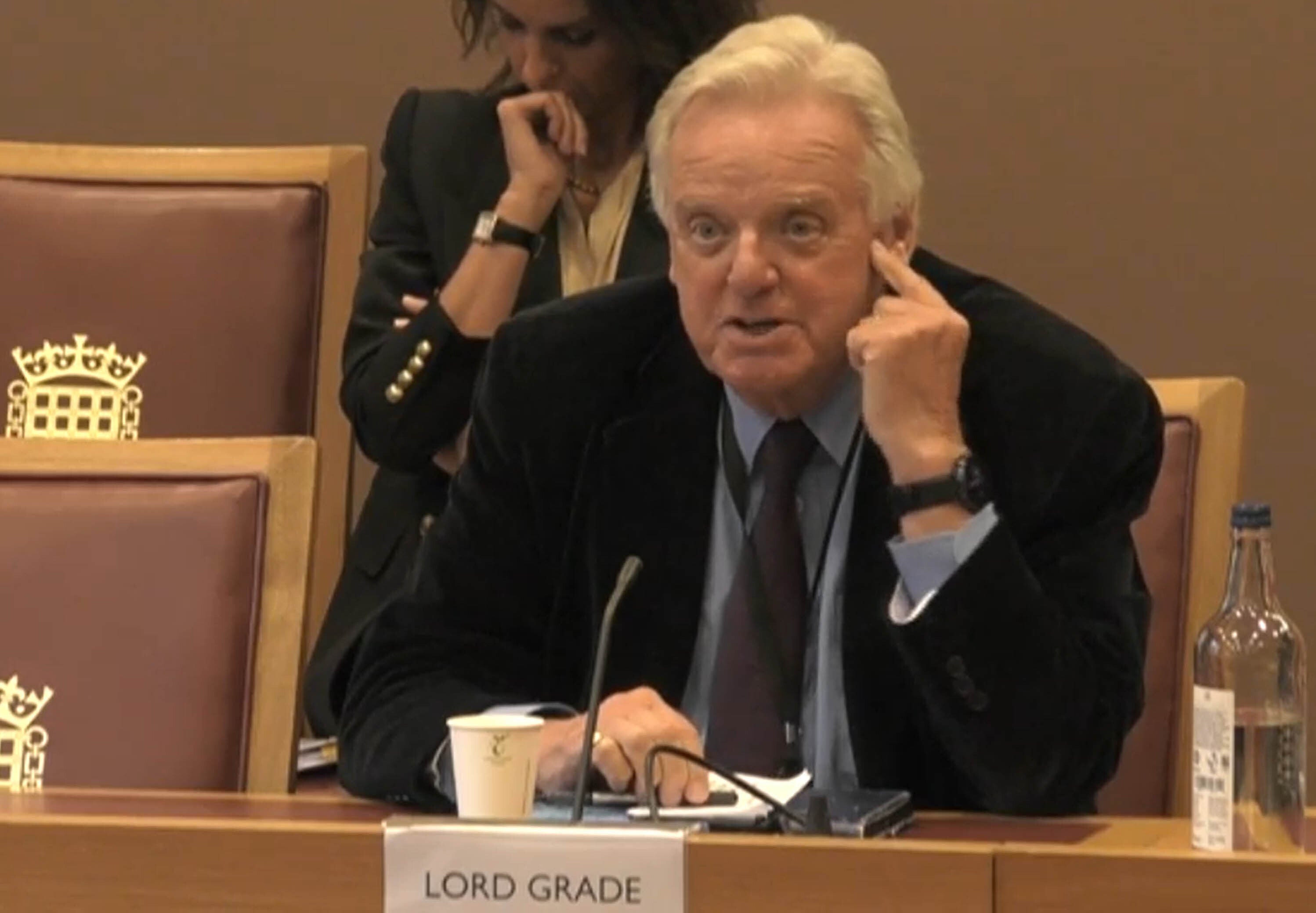New Ofcom chief Lord Grade defends branding BBC licence fee ‘regressive’
The peer is being grilled by MPs about the selection process for his role, online safety and public service broadcasting.

Your support helps us to tell the story
From reproductive rights to climate change to Big Tech, The Independent is on the ground when the story is developing. Whether it's investigating the financials of Elon Musk's pro-Trump PAC or producing our latest documentary, 'The A Word', which shines a light on the American women fighting for reproductive rights, we know how important it is to parse out the facts from the messaging.
At such a critical moment in US history, we need reporters on the ground. Your donation allows us to keep sending journalists to speak to both sides of the story.
The Independent is trusted by Americans across the entire political spectrum. And unlike many other quality news outlets, we choose not to lock Americans out of our reporting and analysis with paywalls. We believe quality journalism should be available to everyone, paid for by those who can afford it.
Your support makes all the difference.Newly-announced Ofcom chairman Lord Michael Grade has said he believes describing the BBC licence fee as “regressive” is not an opinion but a “statement of fact”.
The 79-year-old Conservative peer, who has held senior positions at all three of the UK’s major media outlets, is appearing before the Digital, Culture, Media and Sport (DCMS) Committee for “pre-appointment scrutiny”.
Such hearings are held to allow select committees to scrutinise the quality of ministerial appointments and assess the candidate’s suitability for the role, knowledge and experience.
Lord Grade has previously spoken in favour of the privatisation of Channel 4 and recently criticised the BBC’s coverage of events such as the Downing Street parties as “gleeful and disrespectful”.
Addressing the debate over the BBC licence fee, he told the DCMS Committee: “Let me just say straight away that my criticism of the licence fee was about the fact that, at the time of the last settlement, their news bulletins were full, quite rightly, of stories about increased use of food banks, hardship across the country, people having to choose whether to heat or to eat – to use the soundbite.
“And there they were, another part of the BBC, asking for more money at the licence fee. As a former chairman of the BBC and a friend of the BBC, a critical friend sometimes, I thought that was wrong and I wanted to say so.”
He added: “I described the licence fee as regressive. I didn’t think that was an opinion, I thought that was a statement of fact, actually.”
Referring to Channel 4 and whether it should be privatised, Lord Grade said: “As far as Channel 4 is concerned, that is my opinion. I fought privatisation twice as chief executive of Channel 4 – once with Mrs Thatcher and once with John Major.
“I would say that the world has changed. There were only four channels in those days and BSB and Sky were broke, so it was a very different world.”
The media executive said he was not asked to apply for the role of Ofcom chairman, and was prompted to do so in part because of his interest in the Online Safety Bill.
Questioned over whether he could be impartial as head of the media watchdog, Lord Grade said: “Ofcom’s enviable reputation as a regulator is based on their processes, their adjudications – their decisions are based on evidence and research.
“And therefore you leave your opinions at the door when you arrive at Ofcom. You have to leave your opinions at the door.
“After a lifetime of broadcasting at the highest levels I have views, as anybody does, but you leave those behind when you get to Ofcom.”
Former Daily Mail editor Paul Dacre was reportedly Prime Minister Boris Johnson’s preferred choice during the initial interviews for the Ofcom role but he withdrew from the process and it was subsequently re-run.
Addressing this, Lord Grade said: “Paul and I have had our battles over the years when he was editor of the Daily Mail and I was running Channel 4, so I know him quite well from those days as an adversary.
“But the fact that there was a vacancy which coincided with my growing interest in the Online Safety Bill – the two things came together. And I felt it would be a very fair and open competition.”
During his career, Lord Grade has served as controller of BBC One, chief executive of Channel 4, chairman of the BBC and executive chairman of ITV plc.
He currently sits as a Conservative peer in the House of Lords after being appointed by David Cameron in 2011.
If confirmed as Ofcom chairman he will move to the cross-benches and give up any non-executive roles that could cause a conflict of interest.
He was named for the position after a lengthy recruitment process which was branded as “chaotic and frankly embarrassing” by Labour.